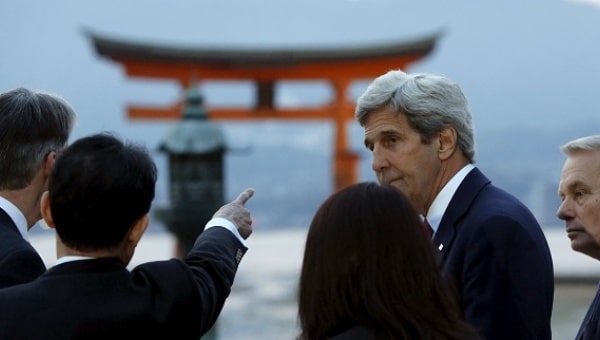
US Secretary of State John Kerry and fellow envoys from the G7 visited Hiroshima’s Peace Memorial Park on the margins of their summit meeting this week.
Kerry was the highest ranking American government official to visit the Peace Park, the memorial dedicated to the victims of the world’s first nuclear attack on August 6, 1945.
US officials are considering a visit to Hiroshima by Nobel Peace Prize winner Barack Obama during his trip to Japan for the G7 in late May. Obama, in 2011, expressed some interest in being the first sitting American president to visit the city, but never purused the plans.
Fellow Nobel Peace Prize winner Jimmy Carter did visit Hiroshima in 1984, albeit as a private citizen after leaving office. Other high-level American visits have been scattered only over recent years; _then-US ambassador to Japan, John Roos attended the annual August 6 commemoration in Hiroshima in 2010, the first US ambassador to ever do so. In 2011, in another first, the United States sent a (lower ranking) official representative to the annual memorial service in Nagasaki. Current ambassador Caroline Kennedy attended the Hiroshima memorial service to mark the attack’s 70th anniversary last year.
Kerry, like his official predecessors to Hiroshima, expressed empathy for the dead without acknowledging culpability for the thing that killed them, almost as if it was an act of nature, or that someone else had done it.
Regarding those predecessors, note the dates; the first American ambassador to visit Hiroshima wasn’t until 2010, 65 years after the atomic bombing. Kerry’s visit, 71 years after the attack, occurred only in the company of his G7 colleagues, and not on the highly-symbolic day of August 6.
All countries get their own history wrong to some degree, and careful retrospection, absent that built into enforced penitence such as was applied to post-WWII Germany, is rare.
Yet as the only nation to use nuclear weapons, and to have used them against near-wholly civilian targets, and having used them under circumstances of arguable necessity, one might expect, 71 years later and now full-allies with Japan, some modicum of introspection by the United States. Absent some academics and “peace advocates,” that has never happened.
In the United States, sometime after with the public announcement in 1945 of the atomic bombings, the message was kneaded into public consciousness that the bombs were not dropped out of hatred, revenge or malice, but of military necessity. The attacks did not reflect American evil, but were merely an inescapable and ugly necessity of a war we didn’t start.
The bombs, we were told, saved millions of lives that would have been lost in a land invasion. Both American and Japanese souls would have perished in that invasion, which seemed to characterize the atomic attacks as almost to the benefit of Japan, in that we killed fewer people that way. The bombs were just the lesser of two evils, it was war, and Hiroshima and Nagasaki were far from the first places civilians were targeted. An undercurrent is more disturbing — they deserved it, life is cheaper over there for Orientals. One way or another, there is a consensus woven into the American narrative that there was simply no choice.
The deeper cause of a lack of introspection seems to lie in a national meme that no moral wrong was committed, and thus no internal soul-searching is necessary. The US is obviously not alone in this way of thinking, and Japan itself is quite guilty of failing to look deep into itself over the atrocities committed in China, Korea and elsewhere during WWII.
But “everybody does it” is obviously the kind of excuse five-year-olds use, and unworthy of the United States. And while other nations committed terrible actions in the Second World War, it is only the United States that has gone on to continue making war on a grand scale; over a million killed in Vietnam (no one knows for sure), an estimated million in Iraq (no one knows for sure), and somewhere between a quarter of a million and half a million in Syria (still accruing.)
Never mind Korea, the Dominican Republic, Lebanon, Haiti, Grenada, Central America, Afghanistan and the others, plus the new twist, global drone wars. Along the way were documented American threats to use nuclear weapons to break the Berlin Blockade, to defend South Korea, to smite the Russians during the Cuban Missile Crisis, to “win” in Vietnam and to save Israel during the Yom Kippur war, as well as other situations use was considered. The US continues to maintain a deployed nuclear arsenal well-beyond any defense needs and in grand excess of that possessed by other nuclear powers.
Perhaps some of those atomic threats are historically arguable, and some may have been more bark than intended bite, but in toto it is hard to dismiss America’s willingness to again use nuclear weapons; indeed, talk of “tactical nukes” comes up in many discussions of what to do if Iran were to develop its own atomic capability. In each threatened use of nuclear weapons, however accurate the delivery and however intended for a military target, the vast power of the bombs ensures civilians deaths and mass, indiscriminate, destruction. Those factors have not been a deterrent to nuclear threats and plans, and have certainly not deterred conventional warfare.
Such thinking is a product of lack of introspection, a sweeping, national generalization that if we do it, it is right. John Kerry is an intelligent man, an educated man who has been to war. Perhaps, as he mumbled platitudinous talking points on his visit to Hiroshima, an additional thought or two about the real meaning of his very late presence there crept in?
Reprinted with permission from WeMeantWell.com.

